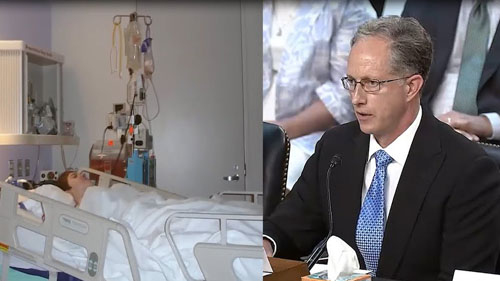| Recent Featured Videos and Articles | Eastern “Orthodoxy” Refuted | How To Avoid Sin | The Antichrist Identified! | What Fake Christians Get Wrong About Ephesians | Why So Many Can't Believe | “Magicians” Prove A Spiritual World Exists | Amazing Evidence For God | News Links |
| Vatican II “Catholic” Church Exposed | Steps To Convert | Outside The Church There Is No Salvation | E-Exchanges | The Holy Rosary | Padre Pio | Traditional Catholic Issues And Groups | Help Save Souls: Donate |  |









 " />
" /> " />
" /> " />
" /> " />
" /> " />
" />




The New Testament is clear that the Sacrament of Baptism is Indispensable for Salvation
I have already discussed John 3:5, so I will now look at some of the other New Testament passages which affirm the absolute necessity of the Sacrament of Baptism for salvation.
THE GREAT COMMISSION – MATTHEW 28 AND MARK 16
In the very last scene recorded in St. Matthew’s Gospel, known as the Great Commission – THE VERY LAST INSTRUCTION THAT JESUS CHRIST GIVES THE APOSTLES BEFORE LEAVING THIS WORLD – Jesus Christ gives His Apostles two commands: to teach all nations and to baptize. Since this is Christ’s very last command to His Apostles, these words carry a special significance. This should tell everyone something about the importance of Baptism. The Sacrament of Baptism is inextricably bound up, by Our Lord Jesus Christ Himself, with the very command to teach all nations the Christian faith. St. Mark’s Gospel reveals the same truth in his version of the Ascension scene, the last scene in his Gospel.
Here we see Our Lord Jesus Christ Himself saying that those who are baptized will be saved, clearly indicating that those who are not baptized will not be saved. But some ask, why didn’t Our Lord say, “he that believeth not and is not baptized shall be condemned,” after saying he that believeth and is baptized shall be saved. The answer is that those who don’t believe are not going to get baptized, so it is not necessary to mention baptism again. Besides, Our Lord says that very thing (that those who are not baptized will not be saved) in John 3:5.
So we see that, in the very last command of Our Lord to the Apostles, the notion of belief and receiving baptism are wrapped up; they are one and the same formula which is necessary for salvation. To believe and to receive the Sacrament of Baptism are one and the same saving event.
ROMANS 5 AND 6
In Romans chapters 5 and 6 we find St. Paul explaining how men are born in the state of original sin, because the sin of the first man, Adam, has caused his descendants to be born bankrupt of the state of grace. St. Paul further explains that Christ reconciles us to God, removes our Original Sin and makes us members of the family of God. In Romans 6:2, St. Paul says that Christians are now dead to sin. And in Romans 6:3, St. Paul explains how this dying to sin has been accomplished.
In this very strong language, St. Paul and the infallible word of God identify the Sacrament of Baptism as the means by which one has died to sin. They also identify the Sacrament of Baptism as the means by which one is incorporated into Christ Jesus.
THE COUNCIL OF TRENT CONFIRMS ROMANS 6:4
In accordance with the infallible declaration of St. Paul in Sacred Scripture, the Catholic Church has defined that there is no condemnation in those who are buried together with Christ by the Sacrament of Baptism unto death.
And here is another regional council which, though not dogmatic, teaches the same truth as the dogmatic statement above: namely, that only by being buried by the Sacrament of Baptism unto death, can one hope to have remission of sin, incorporation with Christ and salvation.
1 CORINTHIANS 12:13
Here we see St. Paul and the word of God forcefully teaching that one comes into contact with the Body of Christ and the Holy Spirit through the Sacrament of Baptism.
THE COUNCIL OF TRENT CONFIRMS 1 COR. 12:13 – NO WATER BAPTISM, NO BODY MEMBERSHIP
Based on this very text [“For in one Spirit were we all baptized into one body”], the Catholic Church infallibly teaches that only through the Sacrament of Baptism is one incorporated into the Body of the Church.
It is a dogma, based on 1 Corinthians, that those who have not received the laver of baptism are “without” the Church; they are not “members of His body”; they are not “of the household of the faith”; and the Church exercises no “judgment” over them. I have already discussed the profound significance of this dogmatic statement in section 7 on “Subjection to the Roman Pontiff,” but I will very briefly repeat that here for the reader’s sake. It is de fide that every human creature must be subject to the Church to be saved, because every human creature must be subject to the Roman Pontiff to be saved.
And if the definition of Trent above on 1 Cor. 12:13 proves that no one can be subject to the Church without water baptism (as it does), this means that no one can be saved without water baptism. All persons are made subject to the Church (and therefore the Roman Pontiff) only by receiving the Sacrament of Baptism.
GALATIANS 3 – FAITH IS BAPTISM
In Galatians 3 we find one of the most famous parts of Saint Paul’s teaching on faith.
But what does St. Paul mean here by this extensive discussion on “faith”? What does he mean when he says, “For you are all the children of God by faith, in Christ Jesus”? Most people probably believe that St. Paul is speaking here of believing that Jesus is the Son of God. This, of course, is indispensable, but it is not even mentioned by St. Paul! Rather, St. Paul explains exactly what he means by “faith in Christ Jesus” – quite naturally in the flow of his epistle – in the very next verse (verse 27).
This very interesting chapter of Scripture should give a message to Protestants and Catholics alike. St. Paul and the word of God are clearly teaching what the Catholic Church has held for 2000 years: that it is by means of the Sacrament of Baptism that one receives faith. That is why the Sacrament of Baptism has been called since apostolic times, “the Sacrament of Faith,” as touched upon already in the section on “The One Church of the Faithful.” And that is why only the water baptized are called the faithful.
Thus, St. Paul was teaching in Galatians 3 that the Sacrament of Baptism is full assurance of faith in Christ Jesus, for without it you do not have the faith and are not among the faithful.
THE COUNCIL OF TRENT CONFIRMS GAL. 3, THAT FAITH = BAPTISM
TITUS 3:5 – BAPTISM SAVES US
In Titus 3:5 we find one of the strongest of all the passages in Sacred Scripture on the necessity of the Sacrament of Baptism.
Here, St. Paul and the infallible word of God tell us that the laver of regeneration (the Sacrament of Baptism) saves us! This means that the water (the laver) and the Spirit (renovation of the Holy Ghost) in the Sacrament of Baptism is the means by which we are justified and saved.
What is very interesting about this passage is that the word of God tells us that it is not “by the works of justice which we have done” that we are saved. In other words, it is not by our desire or our blood or our contrition that we are saved, but by the Sacrament itself that Christ instituted (the laver of regeneration and renovation of the Holy Ghost).
THE FOURTH LATERAN COUNCIL DEFINES THE TRUTH OF TITUS 3:5
EPHESIANS 4:5 – One Spirit – One Body – One Faith – One Lord – One Baptism.
Here St. Paul (in the infallible word of God) is describing the unity in the Church of Jesus Christ. And look at the list that he gives: One Lord, One Faith, One God, One Father. And right up there with “Lord” and “Faith” and “God” and “Father” is Baptism. This tells us that St. Paul sees Baptism as loaded with importance; in fact, as having an importance in terms of the unity of the Body of Christ equivalent to things which nobody can dispute: one Lord, one Faith, one God. This is because it is through this Baptism that we are united to God and the Body of the Church. To deny that the members of Christ’s Body have this one Baptism is equivalent to denying that they have one Lord and one Faith.
What’s interesting about this quotation from St. Jerome is that he is pointing out that the “one baptism” shared by all in the Church (according to Ephesians 4:5) is not simply one in terms of the number of baptisms, but it is “one” in regard to the manner in which all have been baptized: all have been baptized in the name of the Father and of the Son and of the Holy Ghost in the Sacrament.
And so essential and inextricably bound up with the Christian Faith is the necessity of the Sacrament of Baptism that St. Aphraates, the oldest of the Syrian Fathers, wrote in 336:
THE COUNCIL OF VIENNE CONFIRMS THE TRUTH OF EPH. 4:5
We see that all who are part of the Catholic Church have the one Baptism of water.
ACTS 2 AND THE FIRST PAPAL SERMON
In Acts Chapter 2 we find the Pentecost scene, the birthday of the New Testament Church. And there we find many extraordinary events recorded, including the first sermon in the New Testament Church by the first Pope, St. Peter.
Here we see the word of God and the first pope teaching the necessity of the Sacrament of Baptism for the remission of sins, as proclaimed in the very first sermon in the Catholic Church.
THE NICENE-CONSTANTINOPLE CREED CONFIRMS ACTS 2
In accordance with this infallible declaration of the word of God, that one must receive the Sacrament of Baptism for the remission of sins, the Catholic Church has defined that there is one baptism given for the remission of sins.
ACTS 16 – THE JAILER AND HIS ENTIRE HOUSE ARE BAPTIZED IMMEDIATELY AFTER HE ASKS WHAT HE MUST DO TO BE SAVED
What’s interesting about this chapter is what the author of the Acts of the Apostles, St. Luke, decided to include. In giving the account of the jailer who was miraculously converted after the earthquake in the prison, St. Luke gives just the briefest of details – the most necessary parts of the story. St. Luke records that the jailer asked Paul and Silas what he must do to be saved. St. Luke records their very brief answer: “Believe in the Lord Jesus, and thou shalt be saved, and thy house.” But notice that St. Luke, before moving on to a different topic, makes sure to mention that the jailer and his entire house were baptized immediately. This shows us once again how receiving baptism is necessary for all for salvation. The fact that the jailer and his family were baptized immediately was a detail which St. Luke viewed as critical to include in a story about the essential things the jailer and his family had to do to be saved.
1 PETER 3:20-21 – WATER BAPTISM AND THE ARK
This is also one of the strongest passages in all of Sacred Scripture on the necessity of the Sacrament of Baptism. Notice the force of St. Peter’s assertion here. Baptism now saves you. And he is talking about Water Baptism (the Sacrament), of course, because he draws an analogy between the baptismal waters and the Flood waters! St. Peter compares receiving the Sacrament of Water Baptism to being on the ark of Noe. As no one escaped physical death outside the ark of Noe during the time of the Flood (only eight souls survived the Flood by being firmly planted on the ark), likewise now no one avoids spiritual death or is saved from original sin without the Sacrament of Baptism!
POPE BONIFACE VIII CONFIRMS THE ARK –
WATER BAPTISM – FLOOD – CHURCH CONNECTION OF 1 PET. 3
As St. Peter says in 1 Peter 3:20-21, that in the days of Noe eight souls were saved from the water by getting into the ark, and now the Sacrament of Baptism being of the like form (that is, of water) now saves us also, so too has the Catholic Church defined as a dogma that entering the Church is as necessary for salvation as being on the ark was necessary in being saved from death. And the only way to enter the Church is through the one baptism of water.
Notice how Pope Boniface VIII defines the unity of the Church as the unity of “the sacraments,” which means that no one can be inside the Church without having received at least the first of the sacraments: Baptism.
Endnotes:
[1] The Life and Letters of St. Francis Xavier by Henry James Coleridge, Vol. 1, p. 162.
[2] Denzinger 791-792.
[3] Denzinger 324.
[4] Denzinger 895; Decrees of the Ecumenical Councils, Vol. 2, p. 704.
[5] Denzinger 468-469.
[6] The Sunday Sermons of the Great Fathers, Vol. 4, p. 5.
[7] Jurgens, The Faith of the Early Fathers, Vol. 3:1424.
[8] Jurgens, The Faith of the Early Fathers, Vol. 3:1425.
[9] Denzinger 799-800.
[10] Decrees of the Ecumenical Councils, Vol. 1, p. 230; Denzinger 430.
[11] Jurgens, The Faith of the Early Fathers, Vol. 3:1717.
[12] Jurgens, The Faith of the Early Fathers, Vol. 3:2251a.
[13] Jurgens, The Faith of the Early Fathers, Vol. 2: 1368.
[14] Jurgens, The Faith of the Early Fathers, Vol. 1: 681.
[15] Decrees of the Ecumenical Councils, Vol. 1, p. 386.
[16] Denzinger 482.
[17] Decrees of the Ecumenical Councils, Vol. 1, p. 24.
[18] Denzinger 468.
[19] The Sunday Sermons of the Great Fathers, Vol. 2, p. 93.
Sign up for our free e-mail list to see future vaticancatholic.com videos and articles.
Recent Content
^